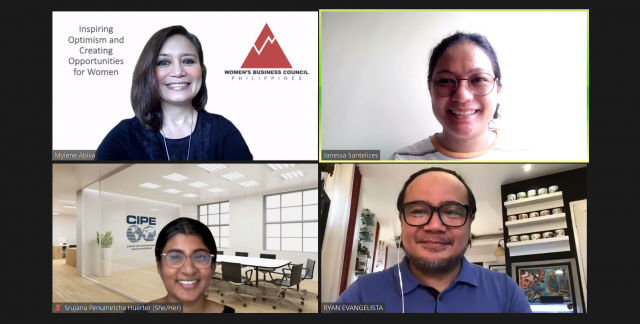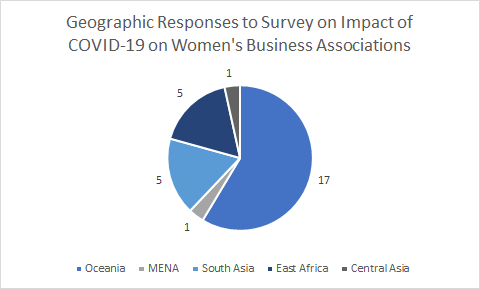In support of the Global Entrepreneurship Network and the 2021 Global Entrepreneurship Week, as well as November 19 – Women’s Entrepreneurship Day – the Center for Women’s Economic Empowerment and CIPE’s Philippines office, are releasing results of a global survey with data on how women’s business associations (WBA) and women entrepreneurs have been affected by and responded to the COVID-19 pandemic this past year.
The Center for Women’s Economic Empowerment (CWEE) at CIPE conducted a global survey to obtain data about how women’s business associations (WBA) and women entrepreneurs have been affected by and responded to the COVID-19 pandemic this past year.
Respondents identified: the need to learn new skills applicable to changing local conditions, opportunities for networking and advocacy, and financial support from governments to ease financial challenges provoked by lockdowns and closures.
“This [pandemic] is not a one-off event,” Ma Aurora Geotina-Garcia, Chair of the Philippine Women’s Economic Network and Co-Chair of the Philippine Business Coalition for Women Empowerment (PBCWE), pointed out. ””In 2020, our concern was ‘how will my business survive? Is this going to be just a short-term – event.’ This is no longer an event but rather this is the now and this is the future. Therefore, the challenge to businesses is: ‘How can I, assuming I survive the pandemic, sustain my business on a long-term basis, given that the environment has changed?’”
In the Philippines, where micro and small enterprises (MSMEs) make up 99% of the registered businesses in the country, the majority of which are women-led, the effects of COVID-19 have been significant.
Business closure greatly affected women-owned businesses, particularly in the women-dominated service industries, including tourism, hospitality, fashion and retail sectors. Many of these sectors were considered “non-essential” and forced to close during lockdowns. Massive financial challenges led many women to shift their business into new, unrelated industries, and additional burdens of both working from home and working for the home resulted in technology access issues and increased incidents of gender-based violence as lockdowns extended and forced couples to remain at home.
Mylene Abiva, President of the Women’s Business Council Philippines (WomenBizPH) notes the pandemic’s compounding challenges for women. “During the Asian financial crisis, we didn’t really feel [the effects of the crisis] since it was not… gender-based, unlike during this COVID crisis where we feel that a lot of the burden is now on the women because not only do we need to lead our businesses, [but] we also need to take care of our families and manage finances.”

In addition to concerns about access to finance and access to markets, women entrepreneurs faced additional mobility and transportation barriers as a travel pass program only allowed one pass per family. These were often given to the head of a household, usually a male. This restriction left businesswomen with the option to face penalties if caught without a pass or reliance on a passholder to conduct business for them.
WBAs such as WomenBizPH and PBCWE worked with women-owned businesses to transition quickly to digital platforms using e-commerce and providing digital skills training; however, connectivity and technology access issues still inhibited many women from the full benefits of online business, especially women-led micro enterprises. This also left them unable to access government programs aimed at providing entrepreneurs with capacity building, skills development and mentorship. “Digitalization was accelerated,” Garcia says. “Because if you don’t, then you would die, how can you survive? [This is] an issue for smaller businesses that don’t have the proper internet access or can’t even buy software to run their businesses. I think the magnitude of the impact differs as to company size and their response is also a function of what resources they have.”
Businesswomen members also found creative ways to support COVID-19 response, such as collecting donations and producing and distributing personal protection equipment (PPE).
Maya Tamayo, Co-founder of the University of Philippines Center for Women’s and Gender Studies Angat Bayi (Amplify Women) program sums up this resiliency of women entrepreneurs in response to the pandemic: “there were businesses that closed down but at the same time, there were opportunities for women entrepreneurs to also find new ways to do business…women lost their jobs, but they find a way because it’s always like that…it’s always the women who try to find ways to augment family income when it’s lacking or when there is none.”
WBAs often provided liaison services, linking members to financial aid programs and online training, and some even developed creative and timely support services for members. Recognizing that paying membership dues is an expense and wanting to ensure members still felt the value of their membership, Abiva came up with the innovative idea of having a virtual gastronomic dining experience for members, leveraging the value add of one of WomenBizPH’s members, the Dusit Thani Hotel in Manila, which was able to cater meal packs. This creative membership engagement strategy allowed WomenBizPH members to continue networking, while enjoying a meal together. Additionally, associations such as the Zonta Club of Philippines conducted webinars raising awareness of violence against women and promoted the use of a free mobile app that links to emergency help and assistance to address the increasing incidents of gender-based violence as families struggled with multiple lockdowns and job losses.
In addition, WBAs advocated for financial support through subsidies and lending windows from the government. PBCWE and WomenBizPH participated in dialogue and multi-stakeholder consultation processes in the form of roundtable discussions to address issues, such as COVID-19 recovery, gender-based violence and sexual harassment (GBVH) and online harassment. The government worked with them and stakeholders such as UNWomen to develop online vocational training, create information stickers about harassment and to design a program on the importance of using a gender lens in business. WomenBizPH also collaborated with the Department of Trade and Industry to launch women’s help desks in the Go Nogosyo “Business” centers around the country, to support women in ease of doing business so they can access technology, workshops, and assistance in registration.
The main needs of the WBAs in the Philippines mirrored those mentioned by other women associations around the world: networking opportunities, membership engagement, and interactions with the government.
They also have demand for continued support in digital transformation and online navigation for businesses. The WBAs highlighted the importance of developing training and support services with a gender lens to consider the particular needs of women entrepreneurs and women-owned businesses. The overall question and priority is, as Abiva notes, “how can we protect our women members from the effects of the COVID-19, both in their personal lives and in their businesses?”
About the Study
The Center for Women’s Economic Empowerment (CWEE) at the Center for International Private Enterprise (CIPE) conducted a global survey to obtain data on how women’s business associations (WBA) and women entrepreneurs have been affected by and responded to the COVID-19 pandemic this past year. This survey complemented other efforts by CIPE to collect data on the effects of the pandemic at the firm level and in certain countries through partner organizations. What makes these results different is the target audience of women’s business associations specifically.
WBAs voiced particular needs and challenges to support their members in COVID-19 response and recovery. Businesswomen need support in digital transformations and access to technology and financing to keep their business viable under continued pandemic lockdowns. WBAs should participate in government roundtables to determine how subsidies and economic recovery measures are created and distributed, and the private sector has a role to play in addressing and mitigating against gender-based violence and sexual harassment, including online harassment. Finally, WBAs highlighted the importance of continued support for advocacy efforts and networking opportunities to connect women leaders and ensure their active participation in recovery efforts.
Methodology

CWEE conducted electronic surveying and key informant interviews from January to March 2021 in Oceania, Africa, Central and South Asia and the Middle East and North Africa regions. The target audience of this data collection effort was chambers of commerce with a focus on promoting women businesses and women’s business associations in emerging markets where CIPE works. The questions included a mix of yes/no answers and individual open responses. CWEE received a total of 29 responses, tailored to the particular context for each women’s business association and their country.
Results from the surveys and key informant interviews can be found below. The first section aims to understand how WBAs have been affected by COVID-19, and the second section addresses current gaps and needs of the WBAs and their members.
How has COVID-19 affected WBA and member businesses?
Respondents specified that financial and business-specific issues were the most prevalent type of challenges during the COVID-19 pandemic, followed by business closures due to COVID-19 and access to other services or funding. Respondents indicated that the most negative impacts on their businesses were a lack of customers and clients due to the pandemic and a greater need for governmental financial assistance.
When asked whether the association had participated in dialogue with the government on economic recovery efforts and the outcome of those consultations, half of the respondents stated that their participation had resulted in the creation of government subsidies and other forms of assistance. Association activities typically included the formation of a private sector task force that sought to create an ongoing dialogue with the government on how to best implement subsidies and other measures to help businesses.
When asked about whether the association offered new products or services because of COVID-19, some respondents said they started offering business related training or support services for businesses applying for loans and government subsidies. Others indicated that their association either increased their social media presence or provided COVID-19 safety resources and training.
The associations that created new offerings as a result of the COVID-19 pandemic did so in order to: advocate for the private sector or support their members, adapt to pandemic challenges generally and respond to COVID-19 safety concerns.
What are the current needs and gaps within WBA as a result of the COVID-19 pandemic?
The top three priorities for WBA as part of COVID-19 response to their members included: assisting members to adapt through business innovation, providing general support services to members, and offering training and capacity support. Other frequently mentioned priorities included financial support, networking opportunities, and increasing association membership. Respondents indicated that providing these pivot support services were part of their organizational mandate and necessary to promote the sustainability and empowerment of women-owned businesses.
The top three immediate needs of the WBA included: financial support, training, and access to supplies and technical assistance for business members. While associations most requested financial support from outside organizations, including CIPE, they also highly valued knowledge sharing, networking opportunities and technical support, like how to engage in advocacy.
Published Date: November 08, 2021